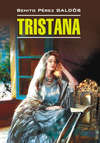Читать книгу: «Dona Perfecta», страница 13
CHAPTER XXIII
MYSTERY
The conference lasted for some time longer, but we omit what followed as not being necessary to a clear understanding of our story. At last they separated, Senor Don Inocencio remaining to the last, as usual. Before the canon and Dona Perfecta had had time to exchange a word, an elderly woman, Dona Perfecta’s confidential servant and her right hand, entered the dining-room, and her mistress, seeing that she looked disturbed and anxious, was at once filled with disquietude, suspecting that something wrong was going on in the house.
“I can’t find the senorita anywhere,” said the servant, in answer to her mistress’ questions.
“Good Heavens—Rosario! Where is my daughter?”
“Virgin of Succor protect us!” cried the Penitentiary, taking up his hat and preparing to hurry out with Dona Perfecta.
“Search for her well. But was she not with you in her room?”
“Yes, senora,” answered the old woman, trembling, “but the devil tempted me, and I fell asleep.”
“A curse upon your sleep! What is this? Rosario, Rosario! Librada!”
They went upstairs and came down again, they went up a second time and came down again; carrying a light and looking carefully in all the rooms. At last the voice of the Penitentiary was heard saying joyfully from the stairs:
“Here she is, here she is! She has been found.”
A moment later mother and daughter were standing face to face in the hall.
“Where were you?” asked Dona Perfecta, in a severe voice, scrutinizing her daughter’s face closely.
“In the garden,” answered the girl, more dead than alive.
“In the garden at this hour? Rosario!”
“I was warm, I went to the window, my handkerchief dropped out, and I came down stairs for it!”
“Why didn’t you ask Librada to get it for you? Librada! Where is that girl? Has she fallen asleep too?”
Librada at last made her appearance. Her pale face revealed the consternation and the apprehension of the delinquent.
“What is this? Where were you?” asked her mistress, with terrible anger.
“Why, senora, I came down stairs to get the clothes out of the front room—and I fell asleep.”
“Every one here seems to have fallen asleep to-night. Some of you, I fancy, will not sleep in my house to-morrow night. Rosario, you may go.”
Comprehending that it was necessary to act with promptness and energy, Dona Perfecta and the canon began their investigations without delay. Questions, threats, entreaties, promises, were skilfully employed to discover the truth regarding what had happened. Not even the shadow of guilt was found to attach to the old servant; but Librada confessed frankly between tears and sighs all her delinquencies, which we will sum up as follows:
Shortly after his arrival in the house Senor Pinzon had begun to cast loving glances at Senorita Rosario. He had given money to Librada, according to what the latter said, to carry messages and love-letters to her. The young lady had not seemed angry, but, on the contrary, pleased, and several days had passed in this manner. Finally, the servant declared that Rosario and Senor Pinzon had agreed to meet and talk with each other on this night at the window of the room of the latter, which opened on the garden. They had confided their design to the maid, who promised to favor it, in consideration of a sum which was at once given her. It had been agreed that Senor Pinzon was to leave the house at his usual hour and return to it secretly at nine o’clock, go to his room, and leave it and the house again, clandestinely also, a little later, to return, without concealment, at his usual late hour. In this way no suspicion would fall upon him. Librada had waited for Pinzon, who had entered the house closely enveloped in his cloak, without speaking a word. He had gone to his room at the same moment in which the young lady descended to the garden. During the interview, at which she was not present, Librada had remained on guard in the hall to warn Pinzon, if any danger should threaten; and at the end of an hour the latter had left the house enveloped in his cloak, as before, and without speaking a word. When the confession was ended Don Inocencio said to the wretched girl:
“Are you sure that the person who came into and went out of the house was Senor Pinzon?”
The culprit answered nothing, but her features expressed the utmost perplexity.
Her mistress turned green with anger.
“Did you see his face?”
“But who else could it be but he?” answered the maid. “I am certain that it was he. He went straight to his room—he knew the way to it perfectly well.”
“It is strange,” said the canon. “Living in the house there was no need for him to use such mystery. He might have pretended illness and remained in the house. Does it not seem so to you, senora?”
“Librada,” exclaimed the latter, in a paroxysm of anger, “I vow that you shall go to prison.”
And clasping her hands, she dug the nails of the one into the other with such force as almost to draw blood.
“Senor Don Inocencio,” she exclaimed, “let us die—there is no remedy but to die.”
Then she burst into a fit of inconsolable weeping.
“Courage, senora,” said the priest, in a moved voice. “Courage—now it is necessary to be very brave. This requires calmness and a great deal of courage.
“Mine is immense,” said Senora de Polentinos, in the midst of her sobs.
“Mine is very small,” said the canon; “but we shall see, we shall see.”
CHAPTER XXIV
THE CONFESSION
Meanwhile Rosario—with her heart torn and bleeding, unable to shed tears, unable to be at peace or rest, transpierced by grief as by a sharp sword, with her thoughts passing swiftly from the world to God and from God to the world, bewildered and half-crazed, her hands clasped, her bare feet resting on the floor—was kneeling, late in the evening, in her own room, beside her bed, on the edge of which she rested her burning forehead, in darkness, in solitude, and in silence. She was careful not to make the slightest noise, in order not to attract the attention of her mother, who was asleep, or seemed to be asleep, in the adjoining room. She lifted up her distracted thoughts to Heaven in this form:
“Lord, my God, why is it that before I did not know how to lie, and now I know? Why did I not know before how to deceive, and now I deceive? Am I a vile woman? Is this that I feel, is this that is happening to me, a fall from which there can be no arising? Have I ceased to be virtuous and good? I do not recognize myself. Is it I or is it some one else who is in this place? How many terrible things in a few days! How many different sensations! My heart is consumed with all it has felt. Lord, my God, dost thou hear my voice, or am I condemned to pray eternally without being heard? I am good, nothing will convince me that I am not good. To love, to love boundlessly, is that wickedness? But no—it is no illusion, no error—I am worse than the worst woman on earth. A great serpent is within me, and has fastened his poisonous fangs in my heart. What is this that I feel? My God, why dost thou not kill me? Why dost thou not plunge me forever into the depths of hell? It is frightful, but I confess it to the priest—I hate my mother. Why is this? I cannot explain it to myself. He has not said a word to me against my mother. I do not know how this is come to pass. How wicked I am! The demons have taken possession of me. Lord, come to my help, for with my own strength alone I cannot vanquish myself. A terrible impulse urges me to leave this house. I wish to escape, to fly from it. If he does not take me, I will drag myself after him through the streets. What divine joy is this that mingles in my breast with so cruel a grief? Lord God, my father, illumine me. I desire only to love. I was not born for this hatred that is consuming me. I was not born to deceive, to lie, to cheat. To-morrow I will go out into the streets and cry aloud to all the passers-by: ‘I love! I hate!’ My heart will relieve itself in this way. What happiness it would be to be able to reconcile every thing, to love and respect every one! May the Most Holy Virgin protect me. Again that terrible idea! I don’t wish to think it, and I think it. Ah! I cannot deceive myself in regard to this. I can neither destroy it nor diminish it—but I can confess it; and I confess it, saying to thee: ‘Lord, I hate my mother!’”
At last she fell into a doze. In her uneasy sleep her imagination reproduced in her mind all she had done that night, distorting it, without altering it in substance. She heard again the clock of the cathedral striking nine; she saw with joy the old servant fall into a peaceful sleep; and she left the room very slowly, in order to make no noise; she descended the stairs softly, step by step and on tiptoe, in order to avoid making the slightest sound. She went into the garden, going around through the servants’ quarters and the kitchen; in the garden she paused for a moment to look up at the sky, which was dark and studded with stars. The wind was hushed. Not a breath disturbed the profound stillness of the night. It seemed to maintain a fixed and silent attention—the attention of eyes that look without winking and ears that listen attentively, awaiting a great event. The night was watching.
She then approached the glass door of the dining-room and looked cautiously through it, from a little distance, fearing that those within might perceive her. By the light of the dining-room lamp she saw her mother sitting with her back toward her. The Penitentiary was on her right, and his profile seemed to undergo a strange transformation, his nose grew larger and larger, seeming like the beak of some fabulous bird; and his whole face became a black silhouette with angles here and there, sharp derisive, irritating. In front of him sat Caballuco, who resembled a dragon rather than a man. Rosario could see his green eyes, like two lanterns of convex glass. This glow, and the imposing figure of the animal, inspired her with fear. Uncle Licurgo and the other three men appeared to her imagination like grotesque little figures. She had seen somewhere, doubtless in some of the clay figures at the fairs, that foolish smile, those coarse faces, that stupid look. The dragon moved his arms which, instead of gesticulating, turned round, like the arms of a windmill, and the green globes, like the lights of a pharmacy, moved from side to side. His glance was blinding. The conversation appeared to be interesting. The Penitentiary was flapping his wings. He was a presumptuous bird, who tried to fly and could not. His beak lengthened itself, twisting round and round. His feathers stood out, as if with rage; and then, collecting himself and becoming pacified, he hid his bald head under his wings. Then the little clay figures began to move, wishing to be persons, and Frasquito Gonzalez was trying to pass for a man.
Rosario felt an inexplicable terror, witnessing this friendly conference. She went away from the door and advanced, step by step, looking around her to see if she was observed. Although she saw no one, she fancied that a million eyes were fastened upon her. But suddenly her fears and her shame were dispelled. At the window of the room occupied by Senor Pinzon appeared a man, dressed in blue; the buttons on his coat shone like rows of little lights. She approached. At the same instant she felt a pair of arms with galloons lift her up as if she were a feather and with a swift movement place her in the room. All was changed. Suddenly a crash was heard, a violent blow that shook the house to its foundations. Neither knew the cause of the noise. They trembled and were silent.
It was the moment in which the dragon had broken the table in the dining-room.
CHAPTER XXV
UNFORESEEN EVENTS—A PASSING DISAGREEMENT
The scene changes. We see before us a handsome room, bright, modest, gay, comfortable, and surprisingly clean. A fine matting covers the floor, and the white walls are covered with good prints of saints and some sculptures of doubtful artistic value. The old mahogany of the furniture shines with the polish of many Saturday rubbings, and the altar, on which a magnificent Virgin, dressed in blue and silver, receives domestic worship, is covered with innumerable pretty trifles, half sacred, half profane. There are on it, besides, little pictures in beads, holy-water fonts, a watch-case with an Agnes Dei, a Palm Sunday palm-branch, and not a few odorless artificial flowers. A number of oaken bookshelves contain a rich and choice library, in which Horace, the Epicurean and Sybarite, stands side by side with the tender Virgil, in whose verses we see the heart of the enamored Dido throbbing and melting; Ovid the large-nosed, as sublime as he is obscene and sycophantic, side by side with Martial, the eloquent and witty vagabond; Tibullus the impassioned, with Cicero the grand; the severe Titus Livius with the terrible Tacitus, the scourge of the Caesars; Lucretius the pantheist; Juvenal, who flayed with his pen; Plautus, who composed the best comedies of antiquity while turning a mill-wheel; Seneca the philosopher, of whom it is said that the noblest act of his life was his death; Quintilian the rhetorician; the immoral Sallust, who speaks so eloquently of virtue; the two Plinys; Suetonius and Varro—in a word, all the Latin letters from the time when they stammered their first word with Livius Andronicus until they exhaled their last sigh with Rutilius.
But while making this unnecessary though rapid enumeration, we have not observed that two women have entered the room. It is very early, but the Orbajosans are early risers. The birds are singing to burst their throats in their cages; the church-bells are ringing for mass, and the goats, going from house to house to be milked, are tinkling their bells gayly.
The two ladies whom we see in the room that we have described have just come back from hearing mass. They are dressed in black, and each of them carries in her right hand her little prayer-book, and the rosary twined around her fingers.
“Your uncle cannot delay long now,” said one of them. “We left him beginning mass; but he gets through quickly, and by this time he will be in the sacristy, taking off his chasuble. I would have stayed to hear him say mass, but to-day is a very busy day for me.”
“I heard only the prebendary’s mass to-day,” said the other, “and he says mass in a twinkling; and I don’t think it has done me any good, for I was greatly preoccupied. I could not get the thought of the terrible things that are happening to us out of my head.”
“What is to be done? We must only have patience. Let us see what advice your uncle will give us.”
“Ah!” exclaimed the other, heaving a deep and pathetic sigh; “I feel my blood on fire.”
“God will protect us.”
“To think that a person like you should be threatened by a –. And he persists in his designs! Last night Senora Dona Perfecta, I went back to the widow De Cuzco’s hotel, as you told me, and asked her for later news. Don Pepito and the brigadier Batalla are always consulting together—ah, my God! consulting about their infernal plans, and emptying bottle after bottle of wine. They are a pair of rakes, a pair of drunkards. No doubt they are plotting some fine piece of villany together. As I take such an interest in you, last night, seeing Don Pepito having the hotel while I was there, I followed him–”
“And where did you go?”
“To the Casino; yes, senora, to the Casino,” responded the other, with some confusion. “Afterward he went back to his hotel. And how my uncle scolded me because I remained out so late, playing the spy in that way! But I can’t help it, and to see a person like you threatened by such dangers makes me wild. For there is no use in talking; I foresee that the day we least expect it those villains will attack the house and carry off Rosarito.”
Dona Perfecta, for she it was, bending her eyes on the floor, remained for a long time wrapped in thought. She was pale, and her brows were gathered in a frown. At last she exclaimed:
“Well, I see no way of preventing it!”
“But I see a way,” quickly said the other woman, who was the niece of the Penitentiary and Jacinto’s mother; “I see a very simple way, that I explained to you, and that you do not like. Ah, senora! you are too good. On occasions like this it is better to be a little less perfect—to lay scruples aside. Why, would that be an offence to God?”
“Maria Remedios,” said Dona Perfecta haughtily, “don’t talk nonsense.”
“Nonsense! You, with all your wisdom, cannot make your nephew do as you wish. What could be simpler than what I propose? Since there is no justice now to protect us, let us do a great act of justice ourselves. Are there not men in your house who are ready for any thing? Well, call them and say to them: ‘Look, Caballuco, Paso Largo,’ or whoever it may be, ‘to-night disguise yourself well, so that you may not be recognized; take with you a friend in whom you have confidence, and station yourself at the corner of the Calle de Santa Faz. Wait a while, and when Don Jose Rey passes through the Calle de la Triperia on his way to the Casino,—for he will certainly go to the Casino, understand me well,—when he is passing you will spring out on him and give him a fright.’”
“Maria Remedios, don’t be a fool!” said Dona Perfecta with magisterial dignity.
“Nothing more than a fright, senora; attend well to what I say, a fright. Why! Do you suppose I would advise a crime? Good God! the very idea fills me with horror, and I fancy I can see before my eyes blood and fire! Nothing of the sort, senora. A fright—nothing but a fright, which will make that ruffian understand that we are well protected. He goes alone to the Casino, senora, entirely alone; and there he meets his valiant friends, those of the sabre and the helmet. Imagine that he gets the fright and that he has a few bones broken, in addition—without any serious wounds, of course. Well, in that case, either his courage will fail him and he will leave Orbajosa, or he will be obliged to keep his bed for a fortnight. But they must be told to make the fright a good one. No killing, of course; they must take care of that, but just a good beating.”
“Maria,” said Dona Perfecta haughtily, “you are incapable of a lofty thought, of a great and saving resolve. What you advise me is an unworthy piece of cowardice.”
“Very well, I will be silent. Poor me! what a fool I am!” exclaimed the Penitentiary’s niece with humility. “I will keep my follies to console you after you have lost your daughter.”
“My daughter! Lose my daughter!” exclaimed Dona Perfecta, with a sudden access of rage. “Only to hear you puts me out of my senses. No, they shall not take her from me! If Rosario does not abhor that ruffian as I wish her to do, she shall abhor him. For a mother’s authority must have some weight. We will tear this passion, or rather this caprice, from her heart, as a tender plant is torn out of the ground before it has had time to cast roots. No, this cannot be, Remedios. Come what may, it shall not be! Not even the most infamous means he could employ will avail that madman. Rather than see her my nephew’s wife, I would accept any evil that might happen to her, even death!”
“Better dead, better buried and food for worms,” affirmed Remedios, clasping her hands as if she were saying a prayer—“than see her in the power of—ah, senora, do not be offended if I say something to you, and that is, that it would be a great weakness to yield merely because Rosarito has had a few secret interviews with that audacious man. The affair of the night before last, as my uncle related it to me, seems to me a vile trick on Don Jose to obtain his object by means of a scandal. A great many men do that. Ah, Divine Saviour, I don’t know how there are women who can look any man in the face unless it be a priest.”
“Be silent, be silent!” said Dona Perfecta, with vehemence. “Don’t mention the occurrence of the night before last to me. What a horrible affair! Maria Remedios, I understand now how anger can imperil the salvation of a soul. I am burning with rage—unhappy that I am, to see such things and not to be a man! But to speak the truth in regard to the occurrence of the night before last—I still have my doubts. Librada vows and declares that Pinzon was the man who came into the house. My daughter denies every thing; my daughter has never told me a lie! I persist in my suspicions. I think that Pinzon is a hypocritical go-between, but nothing more.”
“We come back to the same thing—that the author of all the trouble is the blessed mathematician. Ah! my heart did not deceive me when I first saw him. Well, then senora! resign yourself to see something still more terrible, unless you make up your mind to call Caballuco and say to him, ‘Caballuco, I hope that—‘”
“The same thing again; what a simpleton you are!”
“Oh yes! I know I am a great simpleton; but how can I help it if I am not any wiser? I say what comes into my head, without any art.”
“What you think of—that silly and vulgar idea of the beating and the fright—is what would occur to any one. You have not an ounce of brains, Remedios; to solve a serious question you can think of nothing better than a piece of folly like that. I have thought of a means more worthy of noble-minded and well-bred persons. A beating! What stupidity! Besides, I would not on any account have my nephew receive even so much as a scratch by an order of mine. God will send him his punishment through some one of the wonderful ways which he knows how to choose. All we have to do is to work in order that the designs of God may find no obstacle. Maria Remedios, it is necessary in matters of this kind to go directly to the causes of things. But you know nothing about causes—you can see only trifles.”
“That may be so,” said the priest’s niece, with humility. “I wonder why God made me so foolish that I can understand nothing of those sublime ideas!”
“It is necessary to go to the bottom—to the bottom, Remedios. Don’t you understand yet?”
“No.”
“My nephew is not my nephew, woman; he is blasphemy, sacrilege, atheism, demagogy. Do you know what demagogy is?”
“Something relating to those people who burned Paris with petroleum; and those who pull down the churches and fire on the images. So far I understand very well.”
“Well, my nephew is all that! Ah! if he were alone in Orbajosa—but no, child. My nephew, through a series of fatalities, which are trials, the transitory evils that God permits for our chastisement, is equivalent to an army; is equivalent to the authority of the government; equivalent to the alcalde; equivalent to the judge. My nephew is not my nephew; he is the official nation, Remedios—that second nation composed of the scoundrels who govern in Madrid, and who have made themselves masters of its material strength; of that apparent nation—for the real nation is the one that is silent, that pays and suffers; of that fictitious nation that signs decrees and pronounces discourses and makes a farce of government, and a farce of authority, and a farce of every thing. That is what my nephew is to-day; you must accustom yourself to look under the surface of things. My nephew is the government, the brigadier, the new alcalde, the new judge—for they all protect him, because of the unanimity of their ideas; because they are chips of the same block, birds of a feather. Understand it well; we must defend ourselves against them all, for they are all one, and one is all; we must attack them all together; and not by beating a man as he turns a corner, but as our forefathers attacked the Moors—the Moors, Remedios. Understand this well, child; open your understanding and allow an idea that is not vulgar to enter it—rise above yourself; think lofty thoughts, Remedios!”
Don Inocencio’s niece was struck dumb by so much loftiness of soul. She opened her mouth to say something that should be in consonance with so sublime an idea, but she only breathed a sigh.
“Like the Moors,” repeated Dona Perfecta. “It is a question of Moors and Christians. And did you suppose that by giving a fright to my nephew all would be ended? How foolish you are! Don’t you see that his friends support him? Don’t you see that you are at the mercy of that rabble? Don’t you see that any little lieutenant can set fire to my house, if he takes it into his head to do so? But don’t you know this? Don’t you comprehend that it is necessary to go to the bottom of things? Don’t you comprehend how vast, how tremendous is the power of my enemy, who is not a man, but a sect? Don’t you comprehend that my nephew, as he confronts me to-day, is not a calamity, but a plague? Against this plague, dear Remedios, we shall have here a battalion sent by God that will annihilate the infernal militia from Madrid. I tell you that this is going to be great and glorious.”
“If it were at last so!”
“But do you doubt it? To-day we shall see terrible things here,” said Dona Perfecta, with great impatience. “To-day, to-day! What o’clock is it? Seven? So late, and nothing has happened!”
“Perhaps my uncle has heard something; he is here now, I hear him coming upstairs.”
“Thank God!” said Dona Perfecta, rising to receive the Penitentiary. “He will have good news for us.”
Don Inocencio entered hastily. His altered countenance showed that his soul, consecrated to religion and to the study of the classics, was not as tranquil as usual.
“Bad news!” he said, laying his hat on a chair and loosening the cords of his cloak.
Dona Perfecta turned pale.
“They are arresting people,” added Don Inocencio, lowering his voice, as if there was a soldier hidden under every chair. “They suspect, no doubt, that the people here would not put up with their high-handed measures, and they have gone from house to house, arresting all who have a reputation for bravery.”
Dona Perfecta threw herself into an easy chair and clutched its arms convulsively.
“It remains to be seen whether they have allowed themselves to be arrested,” observed Remedios.
“Many of them have—a great many of them,” said Don Inocencio, with an approving look, addressing Dona Perfecta, “have had time to escape, and have gone with arms and horses to Villahorrenda.”
“And Ramos?”
“They told me in the cathedral that he is the one they are looking for most eagerly. Oh, my God! to arrest innocent people in that way, who have done nothing yet. Well, I don’t know how good Spaniards can have patience under such treatment. Senora Dona Perfecta, when I was telling you about the arrests, I forgot to say that you ought to go home at once.”
“Yes, I will go at once. Have those bandits searched my house?”
“It is possible. Senora, we have fallen upon evil days,” said Don Inocencio, in solemn and feeling accents. “May God have pity upon us!”
“There are half a dozen well-armed men in my house,” responded the lady, greatly agitated. “What iniquity! Would they be capable of wanting to carry them off too?”
“Assuredly Senor Pinzon will not have neglected to denounce them. Senora, I repeat that we have fallen upon evil days. But God will protect the innocent.”
“I am going now. Don’t fail to stop in at the house.”
“Senora, as soon as the lesson is over—though I imagine that with the excitement that there is in the town, all the boys will play truant to-day–But in any case I will go to the house after class hours. I don’t wish you to go out alone, senora. Those vagabond soldiers are strutting about the streets with such insolent airs. Jacinto, Jacinto!”
“It is not necessary. I will go alone.”
“Let Jacinto go with you,” said the young man’s mother. “He must be up by this time.”
They heard the hurried footsteps of the little doctor, who was coming down the stairs in the greatest haste. He entered the room with flushed face and panting for breath.
“What is the matter?” asked his uncle.
“In the Troyas’ house,” said the young man, “in the house of those—those girls—”
“Finish at once!”
“Caballuco is there!”
“Up there? In the house of the Troyas?”
“Yes, senor. He spoke to me from the terrace, and he told me he was afraid they were coming there to arrest him.”
“Oh, what a fool! That idiot is going to allow himself to be arrested!” exclaimed Dona Perfecta, tapping the floor impatiently with her foot.
“He wants to come down and let us hide him in the house.”
“Here?”
The canon and his niece exchanged a glance.
“Let him come down!” said Dona Perfecta vehemently.
“Here?” repeated Don Inocencio, with a look of ill-humor.
“Here,” answered the lady. “I don’t know of any house where he would be more secure.”
“He can let himself down easily from the window of my room,” said Jacinto.
“Well, if it is necessary–”
“Maria Remedios,” said Dona Perfecta, “if they take that man, all is lost.”
“I am a fool and a simpleton,” answered the canon’s niece, laying her hand on her breast and stifling the sigh that was doubtless about to escape from it; “but they shall not take him.”
Dona Perfecta went out quickly, and shortly afterward the Centaur was making himself comfortable in the arm-chair in which Don Inocencio was accustomed to sit when he was writing his sermons.
We do not know how it reached the ears of Brigadier Batalla, but certain it is that this active soldier had had notice that the Orbajosans had changed their intentions; and on the morning of this day he had ordered the arrest of those whom in our rich insurrectional language we are accustomed to call marked. The great Caballuco escaped by a miracle, taking refuge in the house of the Troyas, but not thinking himself safe there he descended, as we have seen, to the holy and unsuspected mansion of the good canon.
At night the soldiers, established at various points of the town, kept a strict watch on all who came in and went out, but Ramos succeeded in making his escape, cheating or perhaps without cheating the vigilance of the military. This filled the measure of the rage of the Orbajosans, and numbers of people were conspiring in the hamlets near Villahorrenda; meeting at night to disperse in the morning and prepare in this way the arduous business of the insurrection. Ramos scoured the surrounding country, collecting men and arms; and as the flying columns followed the Aceros into the district of Villajuan de Nahara, our chivalrous hero made great progress in a very short time.
Покупайте книги и получайте бонусы в Литрес, Читай-городе и Буквоеде.
Участвовать в бонусной программе




















